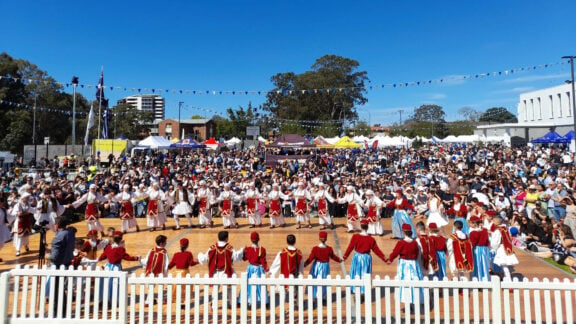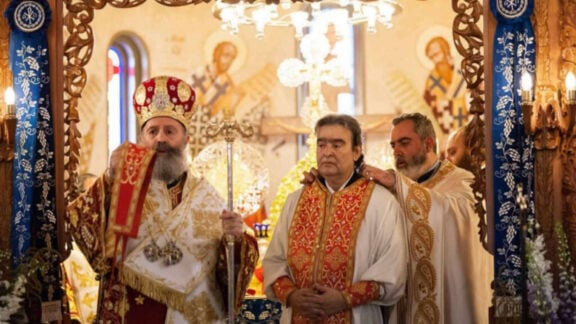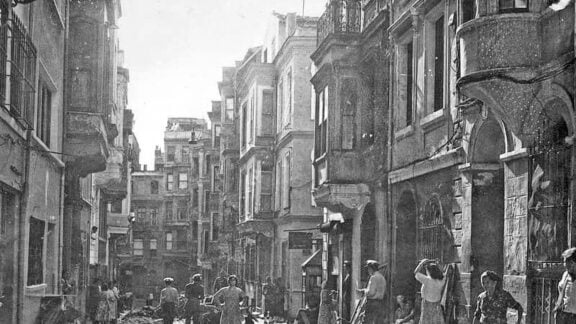In Greece, school children march at the annual Ohi Day parade on 28 October, a public holiday.
In the Antipodes, Greek-Australian youth grow up learning all there is to know about Gallipoli, they may know that there is a link between Greek and Australian histories, but it is up to the parents and Greek schools to drum the message of Greek Resistance.
We asked young Greeks what Ohi Day means to them and what they know about the day.
Their answers were revealing.
Janna Trifon – President of NUGAS
The “Day of No” is an important public holiday for Greeks across the globe to celebrate the courage and leadership of Greek leader Ioannis Metaxas when he rejected an ultimatum given by Benito Mussolini. The refusal was to decline Italy from occupying strategic areas of Greece during World War II, which ultimately led to the Greco-Italian War.
This day has a significant bearing on myself and my family as many of my blood relatives fought for their homeland and still do today. My uncles wear their Greek uniform with honour and have devoted their lives to their country. As Winston Churchill once commented “we will not say that Greeks fight like heroes, but that heroes fight like Greeks”. Therefore, the celebration of OXI Day is one for us to pay our respects to those that fought for their country and continue to do so today.
This public holiday is commemorated by Greeks around the world and as Greek-Australian’s I firmly believe this day still maintains its significance even though we reside in Australia. As first, second and third generation migrants much of our gratitude is owed to our relatives that have come before us. Many of whom would have been adversely affected if we did not showcase our resilience of “Ohi”. As such, I believe learning about Ohi Day is paramount as Greek Australians.
READ MORE: 70th Anniversary of Ohi Day

William Dasopatis – NUGAS General Committee Member and President of MUNGA
Before being asked to write on the topic, I knew nothing about the significance of Ohi day, nor what it was. After speaking with my father, who was well versed on the historical date, I soon came to grasp its importance for both Greeks abroad, and those living in Australia.
Beyond its historical significance, establishing the landmark point in the Second World War in which Greece made its first act of resistance against the axis powers, it reflects something much deeper.
The fervent rejection of Greece’s surrender to Italian dictator Benito Mussolini, stands as a brazen testament to the courage of Greeks in the face of imposition. The gallantry of those in World War Two, to oppose commination, is something we can all relate to, and strive to replicate in our day to day lives.
The importance of being able to say no, is a skill the exceeds culture and age, and is why Ohi day should forever be celebrated and cherished.
Eleni Lykopandis – NUGAS Member and LUGS General Committee Member
Ohi Day is without a doubt one of the most culturally important celebrations for the Greek community. It is the day when then Prime Minister Ioannis Metaxas forcefully rejected the ultimatum given by Mussolini, plunging Greece into the middle of the second world war and sending a message to the Axis powers: We would rather go to war than give up our right of freedom and democracy. For me, this shows the strength and bravery of the Greek people to come together and rally down the streets shouting Ohi, with their pride and love for the nation coming before all else. It is necessary for Greek Australians to learn about Ohi Day, to show them what Greece has done not only for them, but for the world, as they held back the Axis powers for six months and changed the tide and outcome of the second world war.

Billy Battista – NUGAS Marketing Officer and Vice-President of MUNGA
In all honesty, 28 October doesn’t change my life. My yiayia would kill me for saying that, but unfortunately, it’s the truth. For many Greek-Australian youth, it feels like any normal day in Spring. If it wasn’t for my brothers and I going to Greek school for so many years, I probably wouldn’t know the significance of “Ohi Day”, let alone the actual events that transpired. Nevertheless, for me, the significance of the date lies in seeing the pride of my yiayia and pappou in their love of patrida and people.
Perhaps it was the hope of the unknown and the refusal to settle that inspired them to risk it all and move to Australia with nothing but a dream. Even though Metaxas didn’t literally say “Ohi”, I’d argue the symbolism of him rejecting Mussolini’s ultimatum is the biggest learning lesson that we should take. There’s more to history than times and dates and the heroics of our past should inspire us in the future. For that, I will be eternally grateful to Ioannis Metaxas and the famous “Ohi”.
READ MORE: Legendary “Ohi” response stands high in the history of ultimatums
Thanos Cheimeras – NUGAS General Committee Member and RUSH Committee Member
On 28 October Greeks all over the world celebrate the anniversary of the legendary Ohi that marked the Greek people’s opposition to fascist provocation. On this day we remember those who gave their lives for the freedom of our homeland, we remember all the patriots who gave the world the first anti-fascist victory. On this day we honour those who had fallen on the front lines of Pindus and we honour all the veterans who are still among us today. History is nothing but an endless dialogue between the past and the present. We are fortunate that our roots are rooted in a past as unique as none other in the world. Ohi Day is a historic milestone between the past and the future, it gives us the opportunity to make a vital trip to the timeline of our national history, to anticipate a better future and to remind us all, that Greece had set a living example of hope for all people of Europe. The aim of the National Anniversary of Greek Independence is to shape and strengthen our National identity, it is a historical event linked with heroic moments and I truly believe that it should be preserved and passed on to generations of Greek-Australians.

Marissa Robotis – NUGAS General Committee Member and RUSH Committee Member
After a quick phone call to my grandparents, I had for the first time learnt what ‘Ohi Day’ is. They explained to me that the Prime Minister of Greece at the time, Ioannis Metaxes, was approached by the Italian Dictator who had demanded an ultimatum which was for Greece to succumb and allow the Axis to take over specific locations within Greece during World War II. Metaxas had rejected this, which led to his response becoming the catalyst for the Greco-Italian War. Growing up, I had never engaged or educated myself in Greece’s historical events. Looking back on my younger years, I wish I had learned and asked more, so when I was presented with the opportunity to write this piece, I immediately accepted it and allowed myself to use this as a way to strengthen my knowledge on a topic that had no true meaning to me, but a much stronger meaning to my Grandparents. It’s important to embrace yourself within every aspect of Hellenism that is promoted throughout Australia, and use celebratory events like Ohi Day, to be proud of the heroism and valour that was shown by Greece 81 years ago.
Apollonas Karakaidos – NUGAS Social and Cultural Officer
Having received my secondary education in Greece, I’ve been taught the historical facts extensively. In one phrase, the Italian dictator Benito Musolini wanted Greece to allow the Italian military to occupy strategic locations in the Greek mainland or face war. The answer was not literally «Όχι» (Νο), but “Alors, c’est la guerre” (Then it is war) which was effectively a NO.
For me, the day is important because it’s actually Greece’s anniversary of taking part in World War Two and siding with the Allies. In Greece, when I attended school we had a celebration-commemoration of the day with poems written during that Era, theatrical performances, music and speeches. This served as interactive learning and regardless of paying attention to the history class, most (if not all) kids know from a very young age the basic historical events surrounding our national day.
Today the meaning of Ohi Day for me is that of resistance. The ability to stand up for yourself, your beliefs, your friends and family and your country when required.










